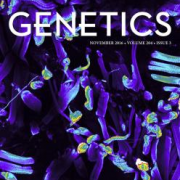In PLoS Genetics:
Intraspecific variation in TEs and their effects
By Xi Wang, Detlef Weigel and Lisa Smith: Transposon Variants and Their Effects on Gene Expression in Arabidopsis
Abstract
Transposable elements (TEs) make up the majority of many plant genomes. Their transcription and transposition is controlled through siRNAs and epigenetic marks including DNA methylation. To dissect the interplay of siRNA–mediated regulation and TE evolution, and to examine how TE differences affect nearby gene expression, we investigated genome-wide differences in TEs, siRNAs, and gene expression among three Arabidopsis thaliana accessions. Both TE sequence polymorphisms and presence of linked TEs are positively correlated with intraspecific variation in gene expression. The expression of genes within 2 kb of conserved TEs is more stable than that of genes next to variant TEs harboring sequence polymorphisms. Polymorphism levels of TEs and closely linked adjacent genes are positively correlated as well. We also investigated the distribution of 24-nt-long siRNAs, which mediate TE repression. TEs targeted by uniquely mapping siRNAs are on average farther from coding genes, apparently because they more strongly suppress expression of adjacent genes. Furthermore, siRNAs, and especially uniquely mapping siRNAs, are enriched in TE regions missing in other accessions. Thus, targeting by uniquely mapping siRNAs appears to promote sequence deletions in TEs. Overall, our work indicates that siRNA–targeting of TEs may influence removal of sequences from the genome and hence evolution of gene expression in plants.



